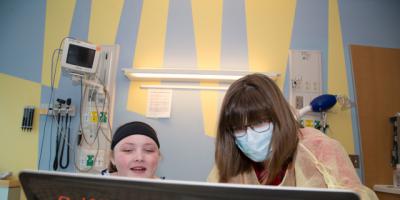Team tackles complex skin cancers

Members of the multidisciplinary melanoma team, from left: surgeon Scott Albert, MD; medical oncologist Adham Jurdi, MD; medical oncologist Abirami Sivapiragasam, MD (known as Abby Siva, MD); and surgical oncologist Ajay Jain, MD. (PHOTO BY SUSAN KAHN)
The majority of melanomas are superficial, discovered at an early stage and easily treated with surgery.
But some patients have more advanced melanomas that require more complex treatment, says Upstate surgeon Scott Albert, MD.

Close-up of a melanoma.
The experts put their heads together to consider surgical options and whether chemotherapy, radiation therapy or other types of treatment are appropriate.
Reduce your risk of skin cancer
-- Limit your exposure to ultraviolet rays.
-- Seek shade, or wear sunscreen, sunglasses, hats and shirts when in the sun.
-- Avoid the use of tanning beds and sun lamps.
Source: American Cancer Society

 This article appears in the spring 2017 issue of Cancer Care magazine. Click here for a radio/podcast interview with Albert about melanoma.
This article appears in the spring 2017 issue of Cancer Care magazine. Click here for a radio/podcast interview with Albert about melanoma. 



